- Home
- Martin Archer
Cage's Crew
Cage's Crew Read online
Cage’s Crew
It was an old Chicago hotel with a distinguished name and a location that still attracted a few upscale clients of a certain age. These days its restaurants and rooms were mostly filled with people traveling on business and tourists in town to see a game or shop on Michigan Avenue. Its owners had maintained the hotel carefully over the years and recently remodeled it. At least, that was what was claimed on the hotel’s website. And that meant, I knew without even looking, there would be a sleepy and out of shape, retired cop in charge of security and surveillance cameras in the lobby and perhaps on the elevators and some of the floors as well. In other words, I wasn’t about to go in through the hotel’s front entrance, not even once, to check things out.
The alley behind the old hotel was dirty and there was the pungent smell of garbage from the big metal bins holding the trash from the hotel’s kitchens and guest rooms. The hotel’s restaurants and bars had closed hours earlier, but the foul odor coming from the big, rusty garbage bins periodically wafted through the alley’s air like an oppressive mist. It had probably been like that for the past sixty or seventy years.
I noticed the smell and dismissed it as meaningless as I made my way to where the old sliding fire escape ladder hung down into the alley. As you might imagine, the rusty ladder hung down just out of reach so that no one could climb up to enter the hotel. Anyone trying to get out of the hotel in an emergency would either have to push the sliding ladder down into the alley or jump the last fifteen feet or so.
When Norm and I had driven through the alley a couple of days ago the sliding ladder looked as though it hadn’t been used in years. That was more than a little worrisome since I was counting on being able to use it. In most cities the fire department inspectors and building inspectors would have tested it to make sure it worked. But this was Chicago so you never knew for sure. Sometimes it is cheaper to buy the inspector instead of the necessary repairs.
Three big doors into a loading dock were on the other side of the alley from the hotel. During the day the doors are open and the loading dock serves people moving things in and out of the many floors of condominiums that rise high above the loading dock. The condominium building had been built many years after the hotel and was much taller than the hotel’s forty or so floors. Almost all of the windows in both buildings were dark, and rightly so. It was, after all, a little after three in the morning.
It was the quietest time of day. The city’s downtown streets had only a few cars and trucks moving on them, and its sidewalks were mostly empty except for the city’s large homeless population sleeping rough in the doorways of the city’s shops and office buildings. My dark running shoes made no sound as I walked slowly along the pitch-black alley with my gloved left hand held out in front to protect me in case a truck or car had been parked in the alley in the long hours since Norm and I had driven past the hotel for one last look before the sun went down.
I had crossed the deserted street and walked down towards the hotel entrance when the hotel’s night bellman was inside and nobody was in sight on the street. At least, I couldn’t see anyone; even though it was certainly possible someone who couldn’t sleep was watching from a darkened hotel or condominium window.
It was the middle of a chilly, early spring night, and I was fairly sure I hadn’t been seen by anyone who would be dangerous when I turned and walked into the alley. Besides, even if the street had been busy or someone had been watching, all anyone would have seen was obviously just another homeless bum looking for a place to get out of the wind so he could sleep rough or take a piss.
Despite the darkness and my disguise, my mind was on high alert as I walked hunched down against the chill wind in a hoodie that was much too large and baggy for me; the kind of heavy hooded sweatshirt someone sleeping rough would wear so he could pull his hands up into its sleeves and hold them together in the big hand-warming pouch, that ran all the way across its front, when he was sleeping on the ground in the cold. I wasn’t using the hoodie to stay warm—my gloved hands were hanging by my side; it was the tools of my trade that were hidden in the hand-warming pouch that ran across the front of my hoodie.
The woman Jack Douglass had sent to get the room number of the man I was there to rob would be hundreds of miles away and well on her way towards home by now in her own car. She’d be paying cash for everything so she couldn’t be traced. Norm had suggested killing her to eliminate a potential witness, but I had decided to let her go because I wasn’t sure of her relationship to Jack Douglass, the man who had suggested the gig to Robbie and provided her to finger our victim. The last thing I wanted to do was bite a hand that fed me, at least not unless it was absolutely necessary.
Norm and I should be safe from the woman, I thought, since she didn’t have a clue as to who we are or where we came from. To the contrary, we had taken great care to disguise ourselves when we met her after she picked up the drug seller in the hotel bar and spent part of the night with him in his hotel room in order to get his room number. Besides, if getting rid of her needed doing, my sometime message center and service provider, Robbie Platts, would find someone and have it done when Norm and I were far away with solid alibis. She was Robbie’s and Jack Douglass’s responsibility to deal with, and eliminate if it became necessary; they were the ones who had brought this particular gig to me and caused me, in turn, to bring in Norm all the way from his ranch in Montana to be my driver.
******
I was wary and on high alert as I turned off the windy and deserted downtown Chicago street and walked into the alley. The alley was totally dark and that, in a way, was comforting despite the uncertainty of what might be in it. Behind me, when I looked back, as I did almost constantly, I could see a faint glimmer at the very end of the alley from a streetlight somewhere on the silent street beyond the alley. The light was so dim and indirect as to make even my silhouette virtually invisible. Even so, as I walked down the deserted alley I stayed close to the old bricks of the original hotel wall on my left to reduce the possibility.
I could have used the little single lens night vision scope I carried in my hoodie’s big frontal pouch along with my other tools, but then I would have looked suspicious if a car with its headlights on had turned into the alley for some reason or an employee had unexpectedly come out of the rear door of the kitchen that served all of the hotel’s restaurants and bars. The kitchen door had no window so it would be a big surprise if it suddenly opened and someone came out for a smoke or to leave for home at the end of his work shift.
A tough-looking derelict of above average height and weight with a seedy, unshaven face, a baggy and overly large dark blue hoodie, uncombed brown hair with specks of grey in it, and a dirty bedroll under his arm is what I would look like to anyone who might chance to see me. At a distance, I would appear to be a totally non-descript homeless man who had wandered down the alley, perhaps to find a place to sleep or take a leak; that was the role I’d play if anyone came upon me before I climbed the fire escape ladder and got into the hotel.
Every big city in America has hundreds of such men sleeping rough and downtown Chicago was no exception despite the cold and windy weather of the early spring. They were everywhere on the city’s streets sleeping and begging year-round and blended into the background unseen, mostly because people deliberately avoided looking at them.
I had briefly thought about sloshing a bit of beer on my hoodie and gargling with it so I’d smell the role but quickly decided against it as a really stupid idea—it might reveal my presence in the dark of the hotel room I intended to visit. I was probably safe enough for this part of the job, or so I thought, because I knew my hoodie and dark blue Levis and black running shoes and socks made me virtually invisible in the dark. Hopefully, I coul
d walk past someone standing in the alley and he’d never even see me.
It was true that the Bluetooth earbud in my right ear would look a little out of place on a rather formidable rough-sleeping homeless man if anyone examined me closely, but it would be long gone from my ear before anyone could get close enough to me to see it. It was connected to the prepaid cell phone I’d bought at a Walmart in Oregon a couple weeks earlier. My phone and the Bluetooth were both “burners” as was everything else I was wearing or carrying; they would be taken apart and tossed away as soon as the job was finished. I never kept anything that could be used to connect me to a job, not even the shoes on my feet.
It wasn’t just my appearance that I was relying on to keep myself safe; I was also heavily armed and wearing a vest under my overly large hoodie because, somehow, this gig hadn’t seemed quite right even though the payoff sounded fine—over six million dollars in loose diamonds with Jack Douglass having a buyer willing to pay fifteen cents on the dollar for them in used twenties and hundreds. I probably wouldn’t have taken the gig if it hadn’t come to Robbie from Jack Douglass and the potential payoff hadn’t been so large.
Douglass was a big-time jeweler in Arizona. According to Robbie, he had been on the edges of the game for years and had come up with a couple of pretty good gigs in the past, including a virtually identical job Norm and I had pulled on a similar diamonds-for-drugs deal two or three years earlier.
In other words, Douglass had an acceptable reputation so far as a man in my line of work was concerned. On top of that, I needed the money because Pencie needed a replacement for the old Cadillac she was driving, one whose title was squeaky clean, and that meant paying cash to actually buy it from a dealer instead of stealing it.
Besides buying a car for Pencie, and maybe even more important, I’d found another parking lot I wanted to buy to help launder the income from one of my newer aliases. The rest of my share of the payout would be spent on the extended up-scale cruise or vacation that I always took with Pencie after a successful job; the rest would go into one of my caches of cash for emergencies or be deposited into one or more of the 401k plans and TIAA-CREF retirement accounts I’d had set up under the various names and social security numbers I had established. Even so, I told myself, I’ll walk away if it looks wrong. I always told myself that when I started a job and sometimes even did it.
Pencie was a sweetie. I’d met her and almost killed her more than five years ago. She’d been with a made man in the Philadelphia Mob when I was part of a crew that took down a Mob-controlled Indian casino in Pennsylvania. It had started to go wrong for us when one of the casino’s security guys had tried to play the hero and I had to shoot him. To my absolute astonishment, she had stepped in to help me get away in her car. We’d been together ever since. She was an ever-cheerful college graduate from one of the country’s larger state universities and a better than average golfer, certainly much better than I would ever be.
******
It was eighty-eight steps from the corner of the building to where the rusty iron fire escape ladder came down and stopped about twelve feet above the alley. I knew exactly how many steps I’d have to take to reach it because I’d walked the alley and counted my steps a couple of days earlier. What I would find when I finished walking those steps in the darkness was a standard fire escape ladder that would slide the rest of the way down into the alley if it was pushed down from above by someone escaping from a fire or anything else that might cause them to have to leave the building in a hurry. I knew that about the ladder from the noon-time walk I’d taken a couple of days ago wearing a suit and tie; at the time, I had been dressed in my version of a local businessman and walking briskly down the alley to take a shortcut to my office or meeting or whatever else a suit does as he goes about his daily life.
I took an extra five steps to make up for the shorter steps I knew I was instinctively taking in an effort to avoid tripping over or kicking something that might have been dropped in the alley. I’d seen a number of bottles and cans in the alley when I walked through it several days ago wearing a suit and tie. The city was not big on cleaning them up and neither was anyone else.
What I was pretty sure I wouldn’t trip across was one of the city’s rough-sleeping vagrants I was pretending to be. The alley had no doorways indented enough to shield a rough sleeper from the chill Chicago winds that came off the lake and periodically gusted through it. Even so, and just to be sure, Norm had driven though the alley late at night several times in the past week. No one was there.
Norm had used the non-descript old Chrysler four-door we’d bought in Detroit off Craigslist for cash and driven it into the city with stolen plates. After the job, we’d abandon it. We could because we both always wore gloves when we were in it so no one could connect us to the car if the car somehow got connected to the job. I hadn’t expected to find anyone in the old brick-lined alley at that time of night and I didn’t. It was totally deserted.
At the moment, Norm was parked on the street about three blocks up from the hotel monitoring the Chicago police frequencies with a little handheld scanner. He could see the hotel’s entrance from where he was parked and would alert me via the ear bud of my Bluetooth to the arrival of police or any other problems or people showing up at the front of the hotel.
Norm was my driver and lookout, the man who would pick me up and drive me to safety after I finished the job. He’d done it before for me on other jobs and he’d do it this time as well. It would be fatal for him not to show up when I whispered into my Bluetooth that it was time to pick me up and drive me to safety. It was something that was understood between us without it ever having to be said.
For his driving and assistance, Norm would get a full share of whatever the job cleared, after its out-of-pocket costs were covered, just as I would. He’d served a hitch in the military and had, on an armored car job in Miami a few years back, described himself to me and the other guys in the crew as our “early warning system and extraction specialist.”
“In other words,” he told us, “I listen to the police radio and drive real good.”
I’d found what Norm had said about himself to be true; that’s why I had invited him to join me on jobs like this one. We’d worked about a dozen jobs together over the years.
This was the kind of job against a large institution that I had been undertaking two or three times a year for almost twenty years. It wasn’t that I would have hesitated to rob an individual or family, it was that even the richest Americans never had anywhere near the kind of cash available that a private safety deposit or armored car company or drug dealership would periodically possess. This gig was slightly different in that millions of dollars worth of illegal heroin was being paid for with loose diamonds that could be easily turned into cash.
It was the kind of job that had worked for me and Norm and the crews we’d been on and put together in the past, and we expected it to do the same this time as well. Heisting over six million dollars’ worth of diamonds and selling them at the fifteen percent of their value, the percentage that Robbie said Jack Douglass had arranged, would generate almost a million dollars in good, used twenty and hundred dollar bills for me and Norm.
My role in the gig was my traditional role—to be one of the heavies and, much more importantly since heavies were a dime a dozen, the planner who designed the job and tried to figure out what might go wrong and how to prevent it; Norm was the driver who would carry me away to safety in a legitimate car with proper paperwork that he had recently and honestly purchased for cash from a Craigslist seller solely for the current operation. Afterwards, we’d clean the car of anything that might link us to the job and abandon it with the keys in its ignition where someone was likely to steal it and leave their fingerprints in it.
If Norm was ever stopped, the name and date of the recent buyer on the seller’s title would honestly conform to the name on whatever out-of-state driver’s license he presented. We never used stolen cars when w
e were on a job. It was too dangerous. The same for our driver’s licenses. They were real; it was the names and addresses on them that were fake. But people move about and buy and sell cars, don’t they? It’s what Americans do.
As you might imagine, Norm and I had set up a number of fallback meeting places and times in case my planned pickup was blown or my cell phone and Bluetooth couldn’t be used to summon him for some reason. If asked, Norm would say he was sleeping in his car because he had a job interview in the morning in the restaurant across the street and had no money for a hotel. Afterwards, we’d dump the one-time car near a public housing project in the city’s low income district with the key in the ignition. Then, after a fifteen-minute walk to a taxi stand next to a couple of all-night coffee shops, we’d take a cab to another similarly clean car some miles away in a public parking lot serving another upscale bar and hotel district.
The car we’d be using to drive out of town tonight had been waiting there for over a week. We’d driven past it several times in the last two days to make sure it was still okay and ready to go. Even so, we had another burner further away as a backup. They’d all be abandoned, even the one we’d use to immediately drive out of town; and they’d be abandoned without fingerprints because we always wore gloves when we were in the cars or might be handling weapons.
Norm and I had worked together on a dozen or more crews over the years. Each of us knew exactly what would happen if he or anyone else crossed the other or didn’t take the necessary safety precautions. He was a hard man and a dependable driver; I was even harder, much harder actually, and did some of the heavy work and all the operational planning. Planning a job was my specialty. I never joined a crew for a job that was planned by someone else unless I knew and agreed with every detail of the job and approved of every man in the crew.
Robbie Platts out in California was my message center and intermediary. He was the cut-out between me and trouble. It was Robbie who took inquiries when a crew needed a heavy or planner like me and he provided the names of possible additional men whenever I came up with a gig that required a specialist or more drivers and heavies than just me and Norm. Sometimes I accepted Robbie’s recommendations; sometimes I didn’t. Norm didn’t know Robbie and had never met him.

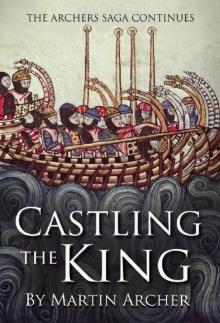 Castling The King
Castling The King Gulling The Kings
Gulling The Kings Israel's Next War
Israel's Next War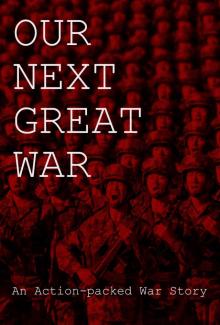 Our Next Great War
Our Next Great War The Captain's Men
The Captain's Men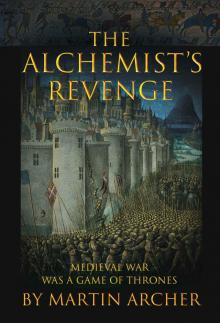 The Alchemist's Revenge
The Alchemist's Revenge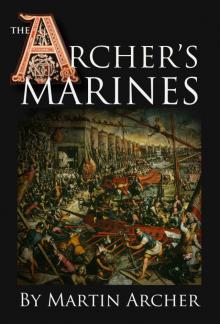 The Archer's Marines: The First Marines - Medieval fiction action story about Marines, naval warfare, and knights after King Richard's crusade in Syria, ... times (The Company of Archers Book 5)
The Archer's Marines: The First Marines - Medieval fiction action story about Marines, naval warfare, and knights after King Richard's crusade in Syria, ... times (The Company of Archers Book 5) Sea Warriors
Sea Warriors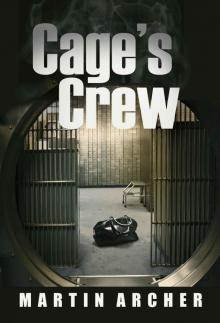 Cage's Crew
Cage's Crew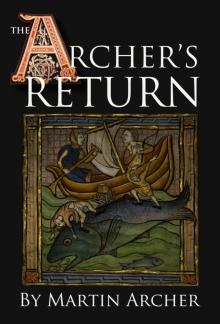 The Archer's Return: Medieval story in feudal times about knights, Templars, crusaders, Marines, and naval warfare during the Middle Ages in England in the reign of King Richard the lionhearted
The Archer's Return: Medieval story in feudal times about knights, Templars, crusaders, Marines, and naval warfare during the Middle Ages in England in the reign of King Richard the lionhearted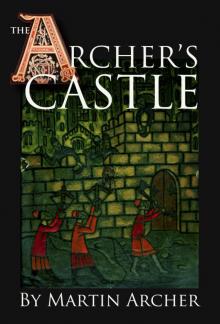 The Archer's Castle: Exciting medieval novel and historical fiction about an English archer, knights templar, and the crusades during the middle ages in England in feudal times before Thomas Cromwell
The Archer's Castle: Exciting medieval novel and historical fiction about an English archer, knights templar, and the crusades during the middle ages in England in feudal times before Thomas Cromwell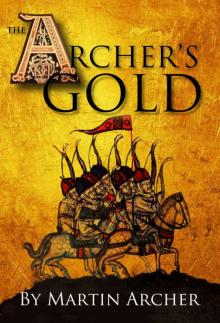 The Archer's Gold: Medieval Military fiction: A Novel about Wars, Knights, Pirates, and Crusaders in The Years of the Feudal Middle Ages of William Marshall ... (The Company of English Archers Book 7)
The Archer's Gold: Medieval Military fiction: A Novel about Wars, Knights, Pirates, and Crusaders in The Years of the Feudal Middle Ages of William Marshall ... (The Company of English Archers Book 7) The Archer's War: Exciting good read - adventure fiction about fighting and combat during medieval times in feudal England with archers, longbows, knights, ... (The Company of English Archers Book 4)
The Archer's War: Exciting good read - adventure fiction about fighting and combat during medieval times in feudal England with archers, longbows, knights, ... (The Company of English Archers Book 4)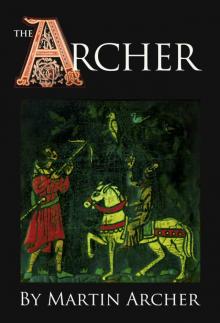 The Archer: Historical Fiction: exciting novel about Marines and Naval Warfare of medieval England set in feudal times with knights,Templars, and crusaders during Richard the lionhearted's reign
The Archer: Historical Fiction: exciting novel about Marines and Naval Warfare of medieval England set in feudal times with knights,Templars, and crusaders during Richard the lionhearted's reign